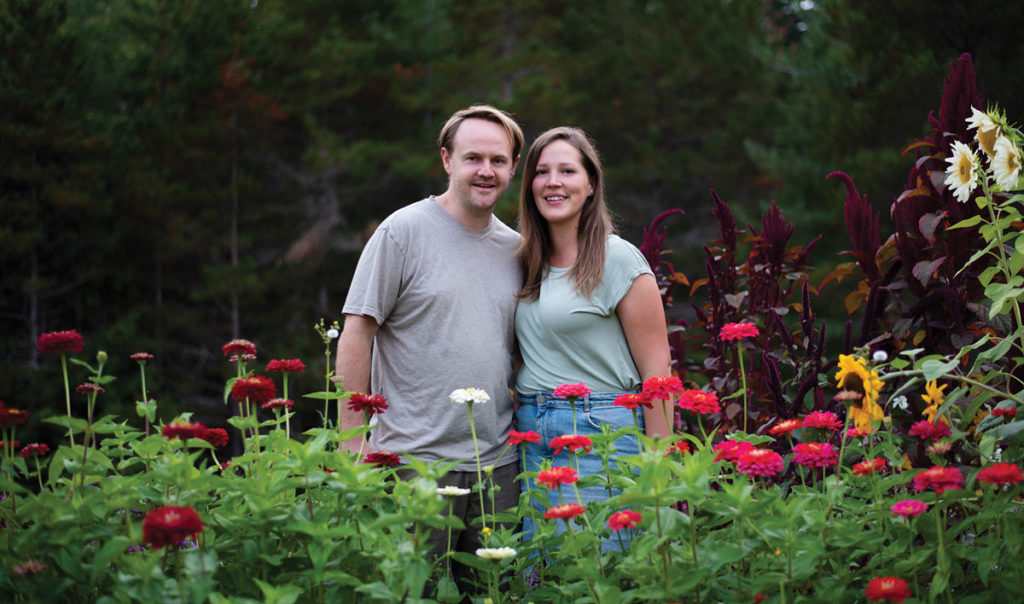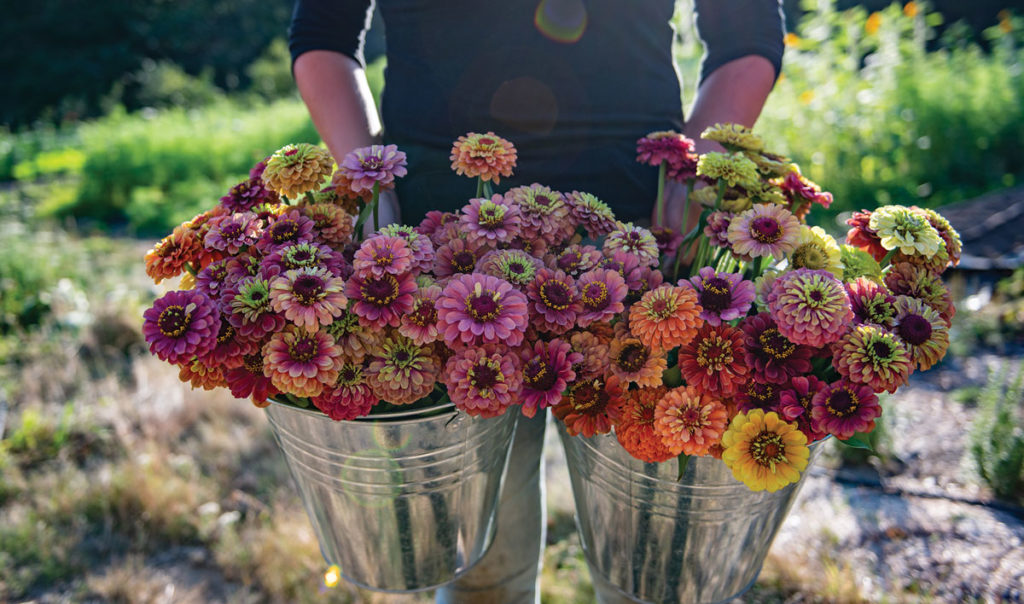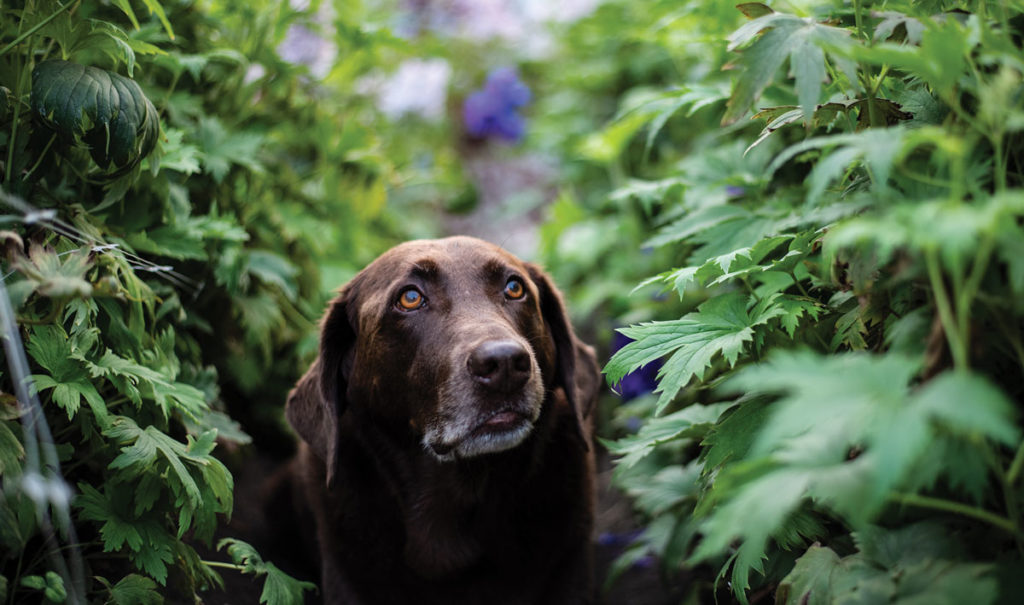BY SHIRLEY CULPIN, PHOTOS BY TARYN PICKARD
It all began seven years ago with a pint of organic cherry tomatoes.
Instead of flowers, the tomatoes were the gift offering from Chris Snook on his first date with Bronwyn Wheeler. Chris was a certified organic vegetable farmer at the time, and very proud of the 100 varieties of tomatoes he was growing. Clearly, Bronwyn was impressed and the pair struck up a relationship that, in hindsight, was serendipitous.
As the relationship between the couple grew, so did Bronwyn’s love of Chris’s five acre farm in the Spider Lake area.
“Chris had WOOFERS (volunteer farm labourers from all over the world) working for him at that point,” recalls Bronwyn. “I just loved them —basically I could travel the world without ever leaving the farm. And I loved the freedom of the farm. I was studying social work at Vancouver Island University at the time, was about half-way through university. But every social worker that came to speak to us in classes seemed unhappy and stressed.”
The upshot was that Bronwyn quit VIU with an eye to working on the farm alongside Chris.
Chris’s original dream for the farm was to develop an orchard and cidery, but because of the long haul necessary to get to that goal, he was growing organic vegetables to support himself and the farm.
“I grew the best salad greens around here,” he says, “and, of course, the tomatoes.”
Bronwyn, however, dreamed of growing flowers. Chris indulged her with a 10×20-foot plot — a minuscule portion of the two and a half acres he had under cultivation.
“I had never grown flowers,” says Bronwyn with a chuckle. “In fact, I had never grown anything in my life. It was a steep learning curve. Chris taught me everything I needed to know. I had to hand water, which took forever.”
The first flower crop included plants that were relatively easy to grow — sunflowers, zinnias, sweet peas, dahlias. When those first floral harvests were taken to the farmers markets they were a major hit with the public.
“No one ever went crazy over salad mix,” says Chris, “but the reaction to our fresh, locally-grown bouquets was huge.”
Each year since that initial offering, the size of the flower garden doubled and fewer and fewer vegetables were produced on the farm. The name of the farm was changed from Vertgen to Island Flower Farm in late 2019, and in 2020 the final commercial food crop — strawberries — was offered.
The pandemic changed everything
Now the farm is totally dedicated to flower production and sales. The two-and-a-half acres not under cultivation remains as forest and provides multitudes of unique foliage and accents for bouquets and, later in the year, seasonal wreaths.
While Island Flower Farm was doing well at the three farmers markets they attended, the onslaught of the pandemic early in 2020 set Chris and Bronwyn back on their heels. Farmers markets were suddenly restricted to offering only food items, which meant no opportunity to sell their flowers to the public. However, nimbleness and a change in their business model has seen the farm continue to thrive, build a devoted customer base and bring joy to many hundreds of local flower lovers.
“I had vowed we wouldn’t do bouquet subscriptions,” says Bronwyn with a laugh. “But the pandemic changed all that and now we are up to 75 a month during the growing season, which runs from June to the end of September. They sell out really quickly.”
To make the monthly subscriptions even more enticing the couple offers free delivery every Saturday from Qualicum Bay to Nanoose Bay. The couple’s parents and a brother have taken on that task, turning Island Flower Farm into something of a family enterprise.
Other innovations at the farm include a pretty little roadside stand that offers 100-200 bouquets a week. More often than not it sells out, frequently in a matter of a few hours. Any bouquets that remain unsold are donated to hospice or care homes.
“I think people just like to get out for a drive and be able to choose their own flower arrangement,” says Bronwyn. “It’s pretty up here and, especially during the pandemic, it offers folks a change of scenery.”
A subscription program for spectacular bouquets of unique tulip blooms in early Springtime has also proven popular, along with tulip bulb sales in the Autumn. Last Autumn, 18,000 tulip bulbs went into the ground to produce this year’s bounty.
500 peonies
When the growing season winds down, Bronwyn and Chris turn their attention to their forest land, where they harvest greens for seasonal wreaths that are sold at the farm stand.
At present, the farm produces a varied and beloved mix of unique annual and perennial flowers. Many of them are old-fashioned varieties that evoke happy memories for the farm’s customers. Chris and Bronwyn are aiming, ultimately, to convert the entire farm to perennial varieties, which will ease up on the work load to some extent. At present, in addition to the annuals in three hoop houses totaling 4,400 square feet, their fields contain 300 peony plants, with another 200 going in this year. Roses and other perennials are there as well, promising a future filled with brightness and beauty.
Although the farm is no longer certified organic as it was when vegetables were being produced, Chris and Bronwyn continue to adhere strictly to organic farming practices. No pesticides or herbicides are used. Ducks and lady bugs are the farm’s free-ranging pest control units along with Charlie, the farm’s 14-year-old chocolate Labrador Retriever.
Although the past few years have offered little but grueling work, Bronwyn says she and Chris are managing to find a little more balance in their lives these days. They have a couple of part-time employees who have reduced some of the work pressure. Bronwyn acknowledges that having help has made a big difference, and clearly understands the importance of work-life balance.
Bouquet recipes
Still, there is never a lack of things to do on the farm. While Chris looks after a lot of the grunt work — installing and maintaining irrigation systems, keeping an eye on tens of thousands of plants, working in the fields — Bronwyn turns her keen eye to the blooms in season and creates ‘recipes’ for the bouquets that they will sell. And, of course, there are all the other aspects of running a business that most don’t think about.
Operating a flower farm may sound dreamy, but success also depends on drudge work like book keeping, ordering, marketing and a host of other tasks.
“Farmers have so many dreams, but there are always so many curves in the road,” says Bronwyn.
There’s one thing for sure, though — flowers are good for the soul, especially in trying times. The spectacular success of Island Flower Farm is proof positive of that, thanks to those curves in the road. And it’s all because of a pint of cherry tomatoes. For more information visit islandflowerfarm.ca, and follow them on Facebook and Instagram.
15,000 spectators

